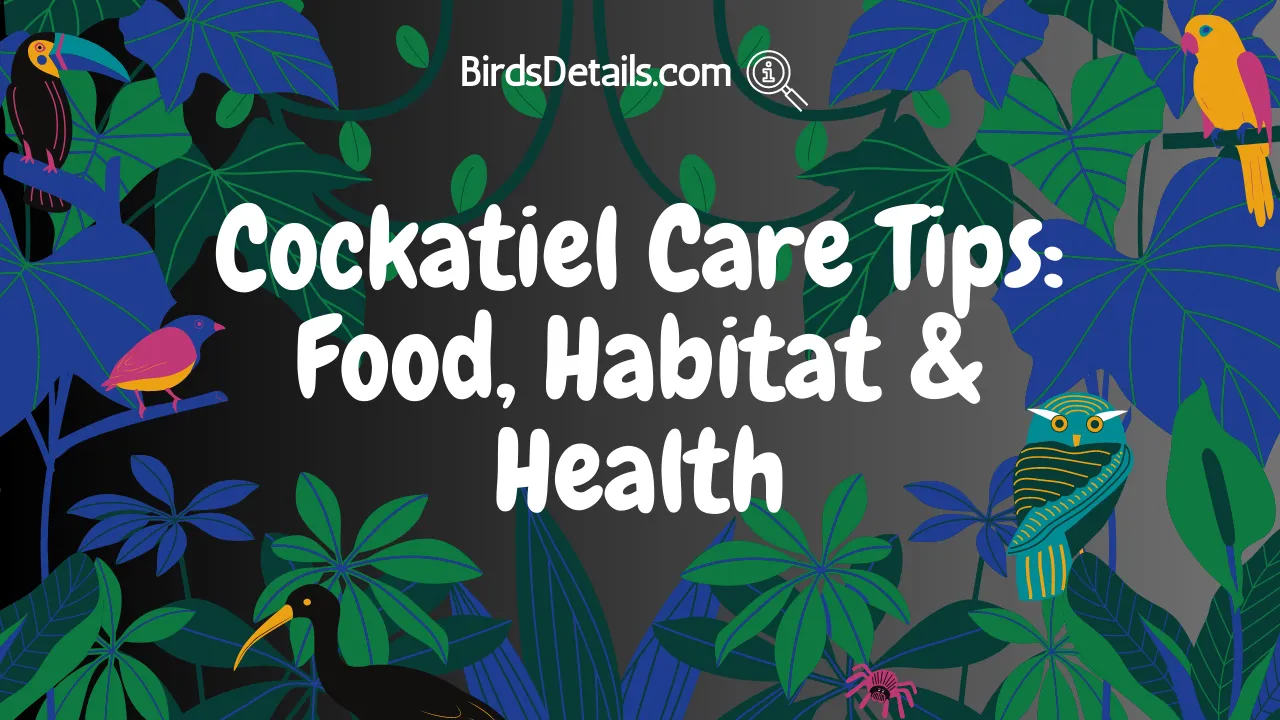Caring for a cockatiel, a type of parrot, can be a rewarding experience, but it requires dedication and attention to detail. These birds are native to Australia and are found in the wild in arid regions. In their natural habitat, wild cockatiels live in flocks and have a social structure that is important for their survival. In captivity, cockatiels need social interaction with humans or other birds to prevent loneliness and boredom. They also require cages to keep them safe and secure. These birds have distinctive crest feathers on their heads and cheek feathers that add to their unique appearance.
| Food | Habitat | Health |
|---|---|---|
| Diet: A cockatiel’s diet should consist of a variety of foods, including pellets, fruits, vegetables, and seeds. Avoid giving your cockatiel avocado, citrus fruits, and rhubarb, as these foods can be toxic to birds. | Habitat: Cockatiels need a spacious cage with plenty of perches, toys, and food and water dishes. The cage should be placed in a quiet area away from drafts and direct sunlight. | Health: Cockatiels are generally healthy birds, but they can be susceptible to certain diseases, such as respiratory infections and feather plucking. It is important to take your cockatiel to the vet for regular checkups. |
Proper nutrition is crucial for parrots, including intelligent birds like cockatiels, as they require a balanced diet of seeds, pellets, fruits, and vegetables. Wild cockatiels feed on a variety of grasses, seeds, and insects. In captivity, it’s important to provide your bird with fresh food and water every day. Cockatiels also need regular exercise to maintain their physical health and mental stimulation. Their beautiful crest feathers and cheek feathers are a testament to their health and well-being.
Female cockatiels, like other parrots, can lay eggs even without a male present. However, if you’re not planning on breeding your intelligent birds or don’t want to deal with egg-laying behavior, it’s best to avoid providing nesting materials or encouraging breeding behavior. Also, make sure to regularly clean their cages and pay attention to any changes in their cheek feathers to ensure their overall health.
Like all parrots, cockatiels can carry diseases that can be transmitted to humans. It’s important to practice good hygiene when handling your bird or cleaning its cage. Regular veterinary check-ups can help ensure that your bird stays healthy. Take care of their crest feathers and provide a suitable habitat for them to thrive.
Providing a safe and comfortable habitat is essential for pet cockatiel care. Your female cockatiel will need a spacious cage with plenty of room to move around and stretch its wings, just like other parrots. Perches of varying sizes will help keep your bird’s feet healthy by preventing sores from forming. Toys will provide mental stimulation while regular cleaning will help keep your pet cockatiel healthy by preventing the buildup of bacteria.
Understanding the Personality of a Cockatiel
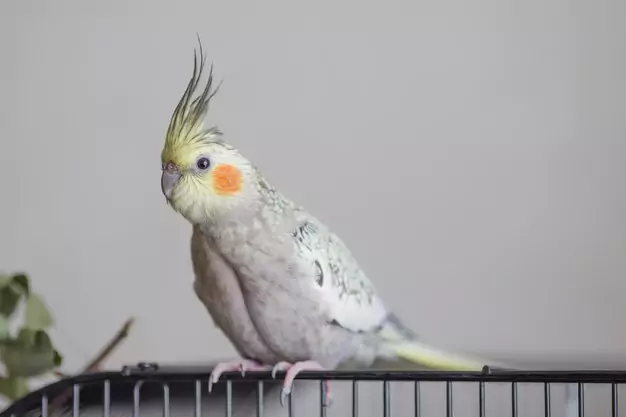
Species and Origin
Cockatiels are a species of parrot that originate from Australia. They are social birds that thrive in flocks and require a suitable habitat to live in. These parrots make great pets for those who want a companion animal and need a perch to perch on. Proper care is essential to ensure their well-being. These birds have been bred in captivity for many years and come in various colors, including gray, white, yellow, and pied.
Highly Intelligent
Cockatiels, like parrots, are highly intelligent birds that can be trained to perform tricks and mimic sounds. They enjoy learning new things and will respond positively to training sessions with their pet parents. These birds have an excellent memory and can remember words or phrases they hear frequently. Providing a comfortable perch is essential for their care.
Curious Nature
Cockatiels, like other parrots, have a curious nature that makes them fun pets to watch. They enjoy exploring their habitat and will investigate anything new that is introduced into their space. Owners should take good care of them by providing plenty of toys and perches for these birds to play with as well as safe spaces where they can retreat when feeling overwhelmed.
Vocalizations
One aspect of cockatiel personality is their vocalizations. These pet cockatiels are known for their whistles, chirps, squawks, and other sounds they use to communicate with each other and their female counterparts. Some parrots may even learn how to mimic human speech or sounds from the household environment. Understanding their habitat is also important in providing them with a comfortable living space.
Biting Behavior
While cockatiels and parrots are generally friendly pets, some may develop biting behavior if not socialized correctly or given enough attention by their owners. Biting could also be due to health issues or stress factors such as changes in the bird’s environment or routine. It is important to provide proper habitat and care for these birds and to take step-by-step measures to socialize them effectively.
Proper Nutrition for Your Cockatiel
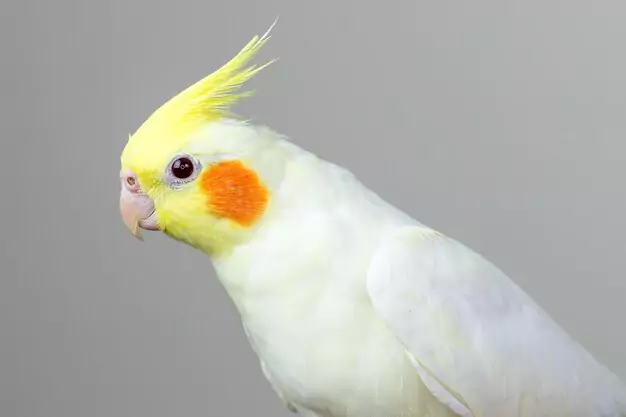
Provide a Balanced Diet for Your Cockatiel
Cockatiels are intelligent and social birds that require proper care and a balanced diet to stay healthy. As pet parents, it is important to provide them with a suitable habitat and a variety of foods that include seeds, pellets, and fresh vegetables. This will help ensure that your cockatiel, as well as other parrots, are getting all the necessary nutrients to maintain good health.
Avoid Feeding Your Cockatiel a Seed-Only Diet
Feeding your male cockatiel only seeds can lead to health problems as it lacks essential nutrients. While seeds are an important part of their diet, they should not be the only food source. Instead, offer a mix of seeds and pellets to provide a well-balanced diet for your parrot. Pellets contain all the necessary vitamins and minerals that your bird needs to stay healthy. It is also important to provide suitable habitat and care for your male cockatiel to ensure its overall well-being.
Offer Millet as a Treat Rather Than a Staple Food
Millet is high in fat and low in nutrients, so it should be offered as a treat rather than a staple food for parrots. Proper care for your tile includes providing a balanced diet with fresh vegetables such as carrots, broccoli, and spinach as part of their daily habitat. Providing too much millet can lead to obesity and other health problems, so it’s important to monitor their intake.
Use Food Bowls That Are Easy to Clean
Pet parents who own parrots must prioritize the care of their feathered friends by ensuring that their habitat is clean and safe. Using food bowls that are easy to clean and replace daily will prevent contamination and spoilage, which is an essential part of parrot care. Dirty food bowls can harbor bacteria that can make your parrot sick, so it’s crucial to wash their bowls with hot water and soap every day.
Ensure Your Cockatiel’s Diet Includes Enough Calcium
Calcium is an essential nutrient for strong bones in birds, and pet parents need to provide proper care for their habitat. One step in caring for cockatiels is to offer cuttlebone or mineral blocks as an excellent source of calcium. These items not only provide entertainment for your birds by allowing them to chew on them but also contribute to their overall health and well-being.
Introduce New Foods Gradually
Introducing new foods gradually will help avoid digestive issues and encourage your young pet bird to try different types of food. Start by offering small amounts of new foods alongside their regular diet inside their birdcage until they become accustomed to it. This is an essential step for pet parents to ensure the overall health of their pet bird.
The Best Habitat for Your Cockatiel
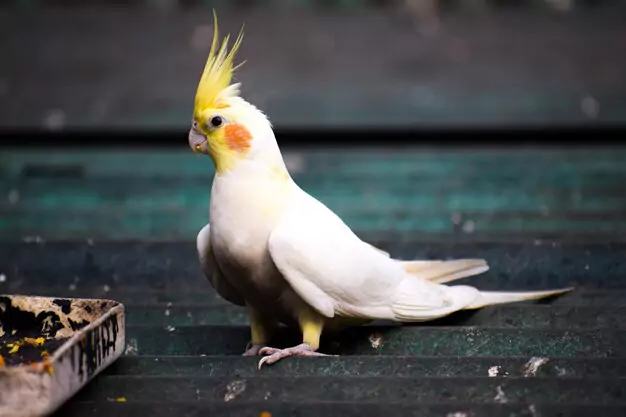
Bird Cage: The Best Habitat for Your Cockatiel
A bird cage is the best habitat for your cockatiel, and taking care of your pet’s needs is essential. It provides a safe and comfortable environment for your pet to live in. However, not all cages are created equal, so it’s important to choose a v4-licensed cage that meets your pet’s requirements. When choosing a cage, it is important to consider the size, design, and material of the cage.
Spacious Cage: Allow Your Cockatiel to Move Freely
The habitat of your cockatiel is important to their care, pet parents should ensure that the cage is spacious enough for them to move around freely. A good rule of thumb is that the cage should be at least twice as wide as your bird’s wingspan and tall enough for it to climb up and down without touching its tail feathers on the bottom of the cage. This will prevent any damage or injury to their feathers. Make sure there is enough space for perches and toys to provide a comfortable v4 environment.
Conducive Environment: Ensure Your Cockatiel’s Health and Well-being
The habitat and environment of the room where the pet cage is placed should be conducive to your cockatiel’s health and well-being. Proper care should be taken to avoid placing the cage in areas with drafts or direct sunlight as this can cause stress or illness in your bird. Keep the room temperature between 65-80°F (18-27°C) with humidity levels between 40-60%. Also, ensure that there are no harmful chemicals or fumes present in the room for the v4 of your pet.
Perches: Allow Exercise and Prevent Boredom
Provide perches at different heights in the cage as part of your cockatiel’s habitat care to allow your pet bird to exercise and prevent boredom. Natural wood perches are ideal as they provide a variety of textures for your bird’s feet and help maintain their nails naturally. You can also include rope perches or PVC perches for added variety and ensure that each perch has a step for your bird to easily climb up and down.
Ground Placement: Expose Your Cockatiel To Predators And Other Hazards
Avoid placing the cage on the ground as it can expose your young or small bird to predators and other hazards such as household pets or accidental falls. Instead, place the cage on a sturdy stand or hang it from the ceiling using a secure chain to provide a safe habitat for your bird’s care.
Basic Supplies Needed for Caring for a Cockatiel

Supplies Needed for Caring for a Cockatiel
Food and Water Dishes
Cockatiels need access to fresh food and water at all times in their bird cage habitat. To take care of them properly, it is important to provide appropriate dishes that fit well in their living space. These dishes can be found in most pet stores or online. When choosing food dishes, look for ones that are easy to clean and won’t tip over easily. Water dishes should be deep enough for your cockatiel to drink from without spilling or splashing water everywhere.
Perches
Perches are essential for pet birds like cockatiels as they spend most of their time in their bird cage habitat. The perches should be made of natural materials like wood, as this helps keep their feet healthy by preventing foot sores. Providing different sizes and shapes of perches will help exercise the muscles in their feet and prevent arthritis. Proper care of the bird cage and its contents is essential for the well-being of your pet bird.
Cage
A cage is necessary to take care of your cockatiel and provide a safe habitat when you’re not around to supervise them. It’s important to choose the right size cage for your bird’s comfort and safety. A cage that is too small can cause stress and lead to health problems such as feather-plucking or aggression while a cage that is too large can make it difficult for your bird to move around comfortably. V4 technology can help you monitor your bird’s well-being while they are in their cage.
Minerals
Cockatiels require minerals such as cuttlebone or mineral blocks in their diet to maintain healthy beaks and feathers. These minerals also provide calcium which helps strengthen bones and teeth. To take care of your cockatiel’s habitat, it is important to add these minerals as a step in their diet routine.
Cleaning Supplies
Regular cleaning of the cage and supplies is a crucial step in taking care of your cockatiel’s habitat. The health and well-being of your bird need to keep the cage clean. You should clean the cage every week using warm soapy water, rinse thoroughly, and then dry it before returning everything into place.
Signs of a Healthy Cockatiel

Vibrant and Consistent Feather Coloration
One of the most obvious signs of a healthy cockatiel is its feather coloration. Cockatiels with vibrant and consistent feather coloration are generally healthy. However, taking care of their habitat is also crucial to ensure their well-being. The feathers should be shiny, smooth, and without any bald patches or discolorations. It’s important to take proper care of their habitat to prevent any health problems. Additionally, color mutations in cockatiels, such as lutino or pied, do not necessarily indicate poor health. These mutations are often caused by genetic factors and can be perfectly healthy.
It’s important to take care of your cockatiel’s feathers by paying attention to their condition. Healthy feathers with a strong shaft and free from damage or fraying are a good sign of a well-maintained habitat. If you notice damaged or broken feathers, it could be a step towards identifying underlying health issues that need immediate attention.
Clear and Bright Eyes
Another key indicator of a healthy cockatiel is its eyes. A healthy cockatiel will have clear and bright eyes without any discharge or swelling. The pupils should be equal in size, and there should be no visible cloudiness or opacity in the eyes. Proper care and attention must be given to ensure the health of your cockatiel’s eyes.
If you take care of your cockatiel, it is important to take the necessary steps to monitor their health. If you notice any changes in your cockatiel’s eye appearance or behavior (such as excessive blinking), it could indicate an infection or other health issue that requires veterinary attention. Therefore, it is important to take the necessary steps to ensure that your cockatiel receives proper v4 care when needed.
Healthy Respiratory System
To take care of your cockatiel’s respiratory health, it is important to follow step v4. A cockatiel with a healthy respiratory system will breathe quietly and without any wheezing or clicking sounds. You may also notice that your bird’s breathing rate is consistent throughout the day.
However, if you hear wheezing sounds when your bird breathes or if they seem to struggle for breath, this could indicate an underlying respiratory issue that requires immediate veterinary attention. To take care of your bird’s health, it is important to step up and seek v4 veterinary care as soon as possible.
Taming Your Cockatiel Care: Getting Them Used to You
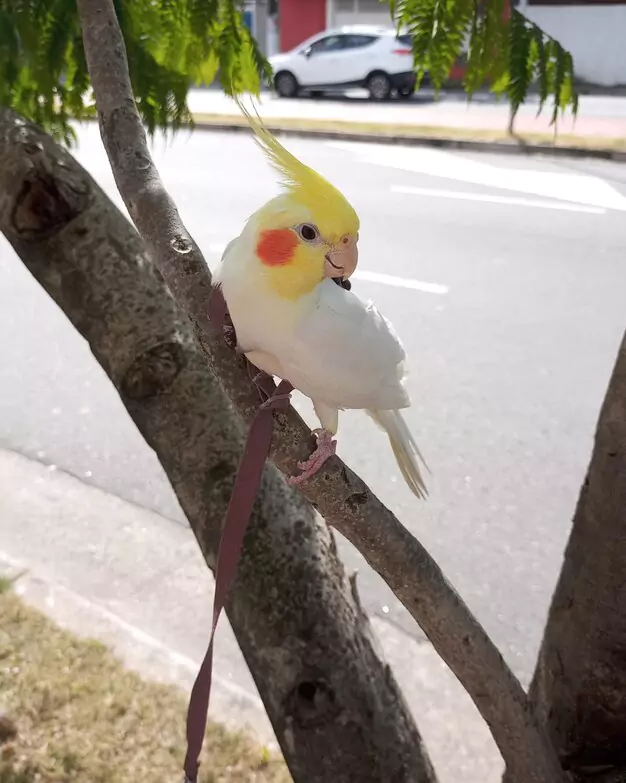
Spend Time with Your Cockatiel Every Day to Get Them Used to Your Presence
To take care of your cockatiel, it is important to take steps to interact with them regularly. Spend time near the cage and talk softly to your bird, taking the necessary steps to get them used to your presence. This will help build a bond between you and your pet, ensuring they receive the care they need.
Start by offering treats through the cage bars to take care of your cockatiel. This step will allow your pet to associate you with positive experiences. Once they are comfortable taking treats from you through the bars, you can start hand-feeding them to take another step towards caring for them. Use a treat that they enjoy, such as millet spray or sunflower seeds.
It is important to take care of your cockatiel and not force interaction on them. Let them take the step to come out of their cage on their terms and explore their surroundings at their own pace. When they do come out of the cage, offer treats or toys as positive reinforcement for good behavior.
Avoid Making Sudden Movements or Loud Noises That May Startle Your Bird
To take care of your cockatiel, it is important to take steps to avoid causing them stress and anxiety. One step you can take is to avoid making sudden movements around your bird, as this may startle them. Additionally, try not to make loud noises in their vicinity to ensure they feel safe and secure.
If you need to move quickly around your bird, take care to do so slowly and calmly. Speak softly while doing so and avoid any sudden movements that may startle your bird. This step is important for the overall care of your bird, especially when cleaning its cage or changing food dishes.
Create a Calm and Quiet Environment for Your Cockatiel
Taking care of your cockatiel involves taking steps to create a calm and quiet environment for them. This is crucial for helping them feel safe and comfortable in captivity and is an important aspect of their overall care. Cockatiels are sensitive birds that require a peaceful environment for optimal health, so it’s important to take the necessary steps to ensure their well-being.
To take care of your pets, provide plenty of natural light during the day but ensure that there is also a dark area where they can sleep undisturbed at night. Take steps to keep noise levels low in the room where they are kept, and avoid placing their cage near a television or other noisy appliance.
Territorial Behavior in Cockatiels: How to Handle Aggression
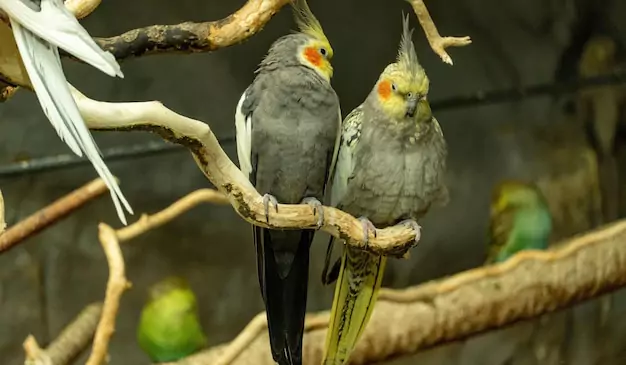
Signs of Aggression in Cockatiels: Hissing, Biting, and Lunging
Cockatiels are generally docile and friendly birds that require proper care. However, they can exhibit territorial behavior, especially during breeding season. Signs of aggression in cockatiels include hissing, biting, lunging, and fluffing up their feathers to appear larger. It’s important to take steps to understand the underlying cause of aggression and avoid triggering it.
One important step in caring for your cockatiel is to take measures to prevent territorial behavior. Lack of space can be a trigger for this behavior, so it’s important to make sure you are taking steps to provide enough room for your bird. Additionally, make sure to take care in providing plenty of toys and perches to keep your bird entertained and stimulated.
Another possible cause of aggression is hormonal changes during the breeding season. Male cockatiels may become more aggressive during this time as they try to take care and protect their mate and territory from perceived threats. In such cases, it’s best to take extra care of your bird and limit handling until the breeding season has passed.
Handling Territorial Behavior: Positive Reinforcement Training
If you take care of your cockatiel, it’s important to take steps when you notice signs of aggression. Do not reinforce this behavior by reacting with fear or anger. Instead, use positive reinforcement training techniques to encourage good behavior while discouraging negative behaviors like biting or hissing.
Positive reinforcement involves rewarding desirable behaviors with treats or praise while ignoring undesirable behaviors like biting or hissing. As a pet owner, it is important to take care of your bird’s well-being and take the necessary steps to ensure their happiness. For example, if your bird steps onto your hand without biting you, reward it with a treat or verbal praise.
It’s important to take care of your bird by establishing boundaries so that it knows what behaviors are acceptable and what are not. One step you can take is if your bird bites you when you try to pick it up from its cage, gently but firmly tell it “no” and put it back inside the cage without any further interaction.
Seeking Professional Advice
If your cockatiel’s aggression persists despite your efforts to manage it, taking the necessary steps to care for it is crucial. Seeking advice from a veterinarian or avian behaviorist can help identify the underlying cause of the aggression and provide guidance on how to take proper care of your pet. They can help you take the necessary steps to address the issue effectively.
In some cases, medication may be necessary to take care of and manage aggressive behavior in birds. However, this step should only be taken as a last resort and under the guidance of a qualified professional.
Annual Vet Examinations for Your Cockatiel: Why They’re Important
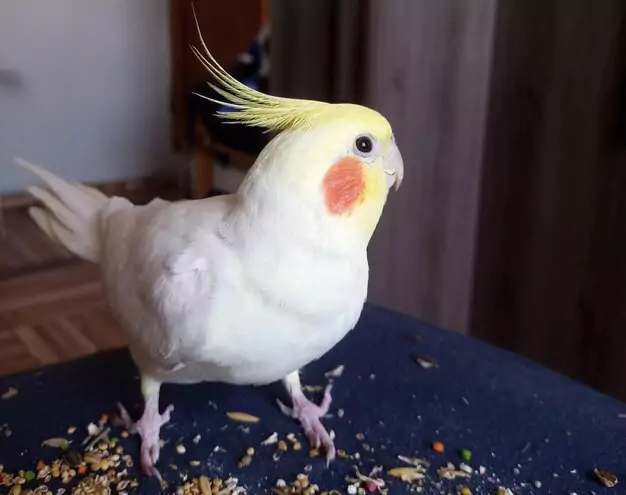
Avian veterinarians specialize in treating birds and have the necessary knowledge and experience to diagnose and treat any health issues your cockatiel may have. As a responsible pet owner, it is important to take the necessary step of scheduling an annual vet examination for your feathered friend to ensure their overall health and well-being. This care can help ensure that your cockatiel stays healthy and happy.
Physical Exam
As a responsible pet owner, it is important to take care of your cockatiel’s health. One step you can take is to schedule an annual vet examination. During this check-up, your veterinarian will perform a physical exam on your bird, checking their weight, feathers, eyes, beak, and feet. They will also listen to their heart and lungs with a stethoscope. This thorough care can help detect any underlying health issues that may not be visible to the naked eye.
Signs of Illness or Disease
Regular vet check-ups are an essential step to take in the care of your cockatiel. They can help detect health problems early on, which increases the chances of successful treatment and improves your bird’s quality of life. Avian veterinarians are trained to identify signs of illness or disease in birds that may not be noticeable to pet owners. By taking this step, you can ensure that your cockatiel receives the best possible care. They will look for symptoms such as changes in appetite or behavior, discharge from the nose or eyes, breathing difficulties, or feather abnormalities.
Treatment and Preventative Measures
If your veterinarian detects any health issues during the exam, they will recommend treatment options specific to your cockatiel’s needs. They may prescribe medication or suggest dietary changes to improve their health. They may recommend preventative measures such as vaccinations or parasite control to take care of your bird’s health. It is important to take steps recommended by your vet to ensure the well-being of your cockatiel.
When To Call A Vet
It is important to know when you should take a step and call a vet outside of scheduled appointments if you notice any sudden changes in behavior or physical appearance in your cockatiel. Some signs that indicate an emergency include difficulty breathing, seizures, bleeding from anywhere on the body (including nostrils), weakness, or inability to stand up properly. Care should be taken to address these issues promptly.
Taking Care of Your Beloved Cockatiel
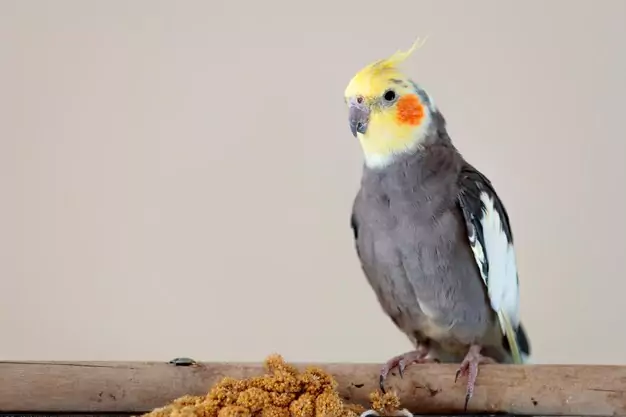
Taking care of your beloved cockatiel requires a deep understanding of their personality. These charming birds are known for their affectionate and playful nature, but they can also be territorial and aggressive if not handled properly. Proper nutrition is essential to take care of your cockatiel and keep them healthy and happy. A balanced diet consisting of fresh fruits, vegetables, seeds, and pellets is recommended.
Creating the right habitat for your cockatiel is a crucial step in taking care of them. You need to consider their needs and ensure they have enough space to spread their wings and fly around comfortably. Basic supplies such as a cage, perches, toys, and food dishes are necessary for taking care of a cockatiel.
Keeping a watchful eye on your bird’s health is an essential step in caring for your cockatiel. Signs of a healthy cockatiel include bright eyes, clean feathers, active behavior, and regular droppings. If you notice any changes in their behavior or appearance, it may be time to take them to the vet for proper care.
Taming your cockatiel takes patience and consistency. Careful step is necessary to ensure their comfort and safety. Spend time with them every day by talking to them softly or offering treats. Over time they will grow used to your presence and become more comfortable around you.
Taking care of territorial behavior in cockatiels can be challenging but it’s important to take steps not to react aggressively towards them. Instead, try redirecting their attention with toys or moving away from the area until they calm down.
Annual vet examinations are a vital step to take in ensuring the care of your pet by detecting any potential health issues early on before they become serious problems.
FAQs About Cockatiel Care Tips
Q1: Can cockatiels eat fruits and vegetables?
Yes, cockatiels can eat a variety of fresh fruits and vegetables. Offer them a range of options to provide essential nutrients.
Q2: How often should I clean the cage?
Regularly clean the cage, removing waste, uneaten food, and soiled bedding. Aim for at least a weekly thorough cleaning.
Q3: Do cockatiels require baths?
Cockatiels enjoy bathing. Offer a shallow dish of water for them to splash in, or gently mist them with water.
Q4: Can cockatiels be trained to do tricks?
Yes, cockatiels are intelligent and can be trained to do simple tricks through positive reinforcement training.
Q5: How do I know if my cockatiel is unwell?
Signs of illness include changes in eating habits, lethargy, fluffed feathers, breathing difficulties, and changes in vocalization. Consult a vet if you notice any concerning behaviors.
